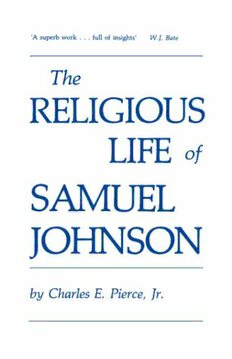
Religious Life of Samuel Johnson PDF
185 Pages·2001·7.804 MB·English
Most books are stored in the elastic cloud where traffic is expensive. For this reason, we have a limit on daily download.
Preview Religious Life of Samuel Johnson
Description:
Samuel Johnson was a deeply religious man and he came to depend on his Christian faith as the principal means by which to endure the pain of existence. He sought throughout his life to render himself worthy of salvation, but the difficulties which he ecperienced in trying to maintain a high degree of reigious discipline - as well as his doubts about God's ultimate concern for man and his fears of his own spiritual unworthiness - led him in to periods of madness and a perpetual dread of damnation. Charles Pierce examines the effect of Johnson's religious concerns upon the formation of his complex character, and on the great moral writing that began with The Vanity of Human Wishes and ended with Rasselas. He explores the paradox of a life which was dedicated to the Christian ideal and tormented by that same ideal. Previous works on Johnson's religious beliefs have been concerned with ascertaining whether what those beliefs were, and not with their effect. The main theme of this study is the importance of Johnson's beleifs in the formation of his character and their effect on the moral values expressed in his greatest writing and on the conduct of his life. It will be essential to anyone interested in the life and thought of one of the greatest English literary figures. Charles E. Pierce, Jr., is Associate Professor of English at Vassar College, N.Y.
See more
The list of books you might like
Most books are stored in the elastic cloud where traffic is expensive. For this reason, we have a limit on daily download.
